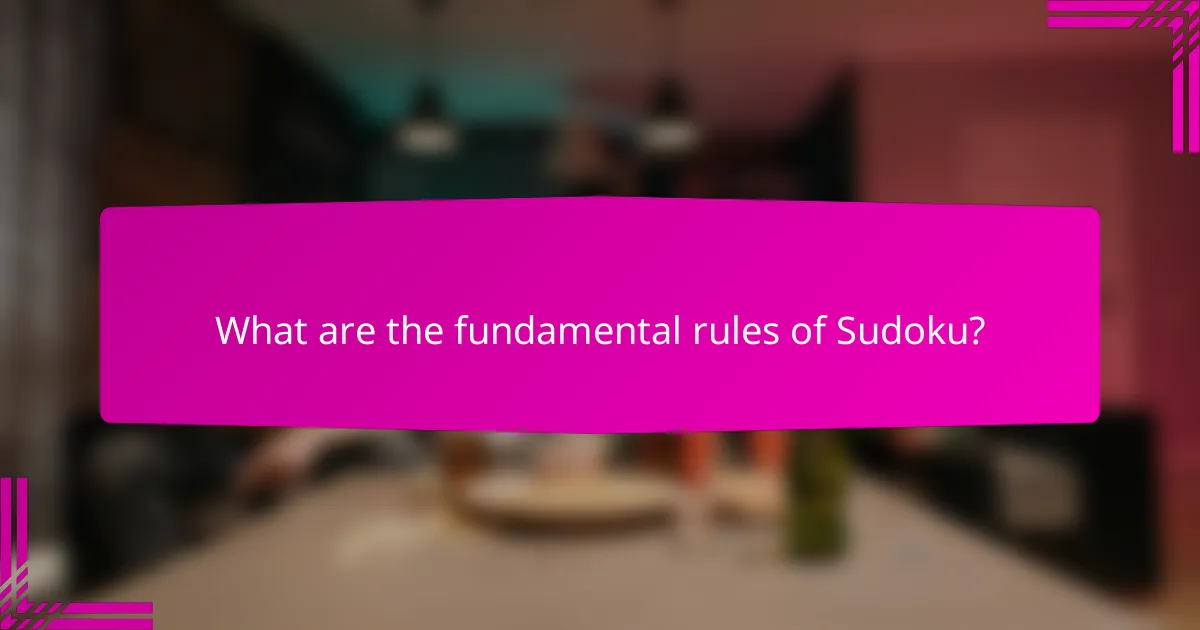Sudoku enhances brain health by improving cognitive functions such as memory and problem-solving. The game follows specific rules to ensure logical play and offers various engaging variations. These include Killer Sudoku, Hyper Sudoku, and Jigsaw Sudoku, each providing unique cognitive challenges. Regular practice can significantly boost mental agility and delay cognitive decline.

What are the fundamental rules of Sudoku?
Sudoku is governed by specific rules that ensure fair play and logical solving. Each row, column, and 3×3 grid must contain the numbers 1 through 9 without repetition. Players must fill in the grid based on given numbers while adhering to these constraints. The objective is to complete the puzzle while maintaining these fundamental principles.
How do the basic rules vary by difficulty level?
The basic rules of Sudoku vary by difficulty level primarily in terms of the number of given clues and the complexity of the logic required to solve the puzzles. Easier levels provide more clues, making it straightforward to deduce the placement of numbers. As the difficulty increases, the number of clues decreases, necessitating advanced techniques like hidden pairs or X-Wing strategies to complete the grid.
What are common strategies for beginners?
To excel at Sudoku, beginners should adopt strategies that enhance their problem-solving skills. Start by familiarising yourself with the rules and basic techniques. Focus on scanning rows, columns, and boxes to identify potential numbers. Use pencil marks to note possibilities for each cell, which aids in visualising options. Additionally, practice regularly to improve pattern recognition and logical reasoning. Engaging in different variations of Sudoku can also boost adaptability and enjoyment.

How does playing Sudoku benefit brain health?
Playing Sudoku enhances brain health by improving cognitive functions like memory, problem-solving, and concentration. Engaging in this puzzle stimulates neural connections, which can delay cognitive decline. Studies indicate that regular Sudoku players show increased mental agility and reduced risk of dementia. Additionally, the game encourages strategic thinking and boosts mood through the satisfaction of solving puzzles.
Which cognitive skills are enhanced through Sudoku?
Sudoku enhances several cognitive skills, including problem-solving, logical reasoning, memory, and attention to detail. These skills improve through the game’s requirement for pattern recognition and strategic thinking. As a result, regular Sudoku practice can lead to better mental agility and cognitive flexibility.
What does research say about Sudoku and mental agility?
Research indicates that playing Sudoku enhances mental agility by improving problem-solving skills and cognitive flexibility. Studies show regular engagement with Sudoku can increase working memory and pattern recognition. A 2019 study found that participants who played Sudoku exhibited a 30% improvement in cognitive tasks compared to non-players. Additionally, Sudoku stimulates various brain regions, promoting overall brain health and potentially delaying cognitive decline.

What are the different variations of Sudoku?
Sudoku has several variations that enhance the traditional gameplay. These include:
1. **Killer Sudoku** – Combines Sudoku with arithmetic, using cages that dictate the sum of the numbers.
2. **Hyper Sudoku** – Features additional regions where numbers must also be unique, adding complexity.
3. **X-Sudoku** – Requires that numbers are unique along both main diagonals, increasing difficulty.
4. **Samurai Sudoku** – Consists of five overlapping grids, creating a larger puzzle with interconnected challenges.
5. **Jigsaw Sudoku** – Uses irregularly shaped regions instead of standard boxes, requiring different spatial reasoning.
6. **Multi-grid Sudoku** – Involves solving multiple Sudoku grids simultaneously with shared numbers.
These variations provide unique challenges and cognitive benefits, enhancing brain health through improved problem-solving skills.
How do classic and modern Sudoku formats differ?
Classic and modern Sudoku formats differ primarily in their grid structure and rule variations. Classic Sudoku typically features a 9×9 grid with numbers 1-9, while modern variations may include different grid sizes and additional symbols or rules. Classic Sudoku emphasizes logic and deduction, whereas modern formats can introduce elements of strategy and creativity, such as irregular shapes or multiple solutions.
What unique attributes do regional Sudoku games possess?
Regional Sudoku games possess unique attributes such as varied grid sizes, distinct regional themes, and culturally inspired rules. These adaptations enhance engagement and challenge players in diverse ways. For example, some regions may incorporate local landmarks or folklore into puzzle designs, offering a fresh perspective on the traditional format. Additionally, the difficulty levels can vary significantly, reflecting local preferences and skill levels.
Which rare Sudoku variations are worth exploring?
Several rare Sudoku variations are worth exploring, including Killer Sudoku, Jigsaw Sudoku, and Samurai Sudoku. These variations offer unique challenges and enhance cognitive skills.
Killer Sudoku combines traditional Sudoku with arithmetic, requiring players to solve sums within outlined regions. Jigsaw Sudoku features irregularly shaped blocks, adding complexity to the standard grid. Samurai Sudoku consists of five overlapping grids, increasing difficulty and strategic planning.
Each variation provides distinct benefits, such as improved problem-solving skills and enhanced concentration. Exploring these rare forms can deepen one’s appreciation for Sudoku while providing fresh mental exercises.

How can Sudoku be integrated into daily routines for maximum benefits?
Sudoku can be easily integrated into daily routines by dedicating specific time slots for practice. Start with 10-15 minutes daily to enhance cognitive functions. Gradually increase duration as skills improve. Incorporate Sudoku during breaks or commutes to maximise engagement. This consistent practice can improve memory and problem-solving abilities.
What expert tips can improve Sudoku-solving skills?
To improve Sudoku-solving skills, practice consistently, analyse completed puzzles, and learn advanced techniques. Regular engagement enhances pattern recognition and logical reasoning.
1. Start with easier puzzles to build confidence.
2. Focus on one number at a time to simplify choices.
3. Use pencil marks for potential candidates in empty cells.
4. Study strategies like naked pairs and pointing pairs.
5. Review mistakes to understand missteps and improve.
What common mistakes should players avoid?
Players should avoid common mistakes that hinder their Sudoku progress. These include overlooking given numbers, neglecting to check rows and columns, and making assumptions without verifying possibilities. Additionally, players often rush their decisions, leading to errors. Taking time to analyse the puzzle thoroughly can enhance performance and enjoyment.
